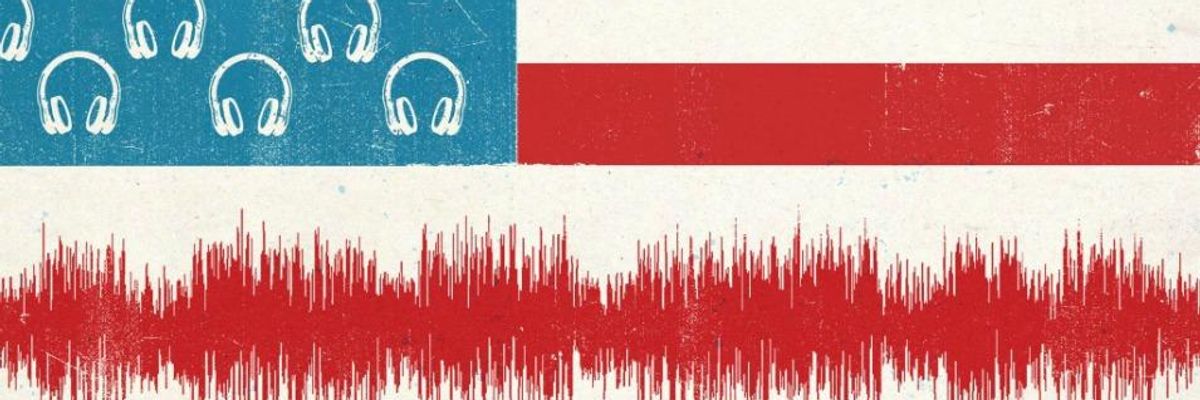
(Image via The Intercept)
To donate by check, phone, or other method, see our More Ways to Give page.

(Image via The Intercept)
In addition to vacuuming up troves of emails, web searches, and other written records, the United States' National Security Agency (NSA) had devised a way to collect spoken communication as well, according to documents from the leaked archive of NSA whistleblower Edward Snowden and reported on Tuesday by The Intercept.
In a top secret government document from 2006, NSA analysts discussed the development of what they called "Google for Voice," which automatically recognizes spoken content, such as in phone calls, "by creating rough transcripts and phonetic representations that can be easily searched and stored," Intercept journalist Dan Froomkin reports.
Further, a second document also from 2006 describes, as Froomkin writes, "extensive use of keyword searching as well as computer programs designed to analyze and 'extract' the content of voice conversations, and even use sophisticated algorithms to flag conversations of interest.
"Spying on international telephone calls has always been a staple of NSA surveillance, but the requirement that an actual person do the listening meant it was effectively limited to a tiny percentage of the total traffic," Froomkin reports. "By leveraging advances in automated speech recognition, the NSA has entered the era of bulk listening."
The reporting notes that these advances were made "with no apparent public oversight, hearings or legislative action." Further, the USA Freedom Act currently making its way through Congress doesn't address the topic at all.
You can read the complete reporting on the NSA's speech-to-text capabilities at The Intercept.
Donald Trump’s attacks on democracy, justice, and a free press are escalating — putting everything we stand for at risk. We believe a better world is possible, but we can’t get there without your support. Common Dreams stands apart. We answer only to you — our readers, activists, and changemakers — not to billionaires or corporations. Our independence allows us to cover the vital stories that others won’t, spotlighting movements for peace, equality, and human rights. Right now, our work faces unprecedented challenges. Misinformation is spreading, journalists are under attack, and financial pressures are mounting. As a reader-supported, nonprofit newsroom, your support is crucial to keep this journalism alive. Whatever you can give — $10, $25, or $100 — helps us stay strong and responsive when the world needs us most. Together, we’ll continue to build the independent, courageous journalism our movement relies on. Thank you for being part of this community. |
In addition to vacuuming up troves of emails, web searches, and other written records, the United States' National Security Agency (NSA) had devised a way to collect spoken communication as well, according to documents from the leaked archive of NSA whistleblower Edward Snowden and reported on Tuesday by The Intercept.
In a top secret government document from 2006, NSA analysts discussed the development of what they called "Google for Voice," which automatically recognizes spoken content, such as in phone calls, "by creating rough transcripts and phonetic representations that can be easily searched and stored," Intercept journalist Dan Froomkin reports.
Further, a second document also from 2006 describes, as Froomkin writes, "extensive use of keyword searching as well as computer programs designed to analyze and 'extract' the content of voice conversations, and even use sophisticated algorithms to flag conversations of interest.
"Spying on international telephone calls has always been a staple of NSA surveillance, but the requirement that an actual person do the listening meant it was effectively limited to a tiny percentage of the total traffic," Froomkin reports. "By leveraging advances in automated speech recognition, the NSA has entered the era of bulk listening."
The reporting notes that these advances were made "with no apparent public oversight, hearings or legislative action." Further, the USA Freedom Act currently making its way through Congress doesn't address the topic at all.
You can read the complete reporting on the NSA's speech-to-text capabilities at The Intercept.
In addition to vacuuming up troves of emails, web searches, and other written records, the United States' National Security Agency (NSA) had devised a way to collect spoken communication as well, according to documents from the leaked archive of NSA whistleblower Edward Snowden and reported on Tuesday by The Intercept.
In a top secret government document from 2006, NSA analysts discussed the development of what they called "Google for Voice," which automatically recognizes spoken content, such as in phone calls, "by creating rough transcripts and phonetic representations that can be easily searched and stored," Intercept journalist Dan Froomkin reports.
Further, a second document also from 2006 describes, as Froomkin writes, "extensive use of keyword searching as well as computer programs designed to analyze and 'extract' the content of voice conversations, and even use sophisticated algorithms to flag conversations of interest.
"Spying on international telephone calls has always been a staple of NSA surveillance, but the requirement that an actual person do the listening meant it was effectively limited to a tiny percentage of the total traffic," Froomkin reports. "By leveraging advances in automated speech recognition, the NSA has entered the era of bulk listening."
The reporting notes that these advances were made "with no apparent public oversight, hearings or legislative action." Further, the USA Freedom Act currently making its way through Congress doesn't address the topic at all.
You can read the complete reporting on the NSA's speech-to-text capabilities at The Intercept.